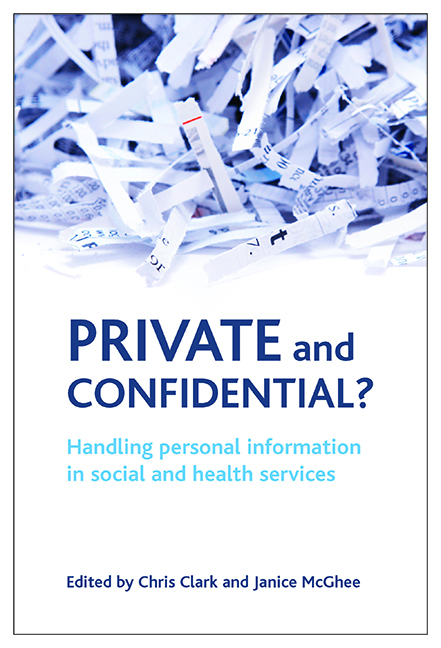eleven - Working together? Sharing personal information in health and social care services
Published online by Cambridge University Press: 21 January 2022
Summary
Introduction
In the 4th century BC Hippocrates made the following statement about the confidentiality of patient information:
Whatsoever things I see or hear concerning the life of men, in my attendance on the sick or even therefrom, which ought not to be noised abroad, I will keep silence thereon, counting such things to be as sacred secrets. (Kennedy and Grubb, 1994, p 637)
If that were to be written today it might say:
Whatever I see or hear in my attendance on the sick or even apart therefrom will be divulged to physicians, nurses, aides, anaesthetists, dieticians, physical therapists, admitting clerks, invoice clerks, discharge planners, record coders, medical records filing staff, chaplains, volunteers, performance evaluators, insurers, medical secretaries, public health officials, government officials, social workers and employers AND to whomever else requests them for whatever reason if appropriate. (Adapted from Givens, 1998, p 2)
This suggests the complexity of modern health systems and tests the assumption that our medical information is confidential. Add to that the need to share across health and social care service boundaries and it is understandable that the principle of ‘private and confidential’ becomes confused.
Professionals are expected to share appropriate information for the better health and care of patients and clients. That is clear. The rules of engagement, however, are a minefield of only partly understood jargon comprising a plethora of guidance policies and protocols. The introduction of fast electronic communication and integrated records has pushed the agenda of information sharing to the forefront. This chapter is about outlining some of the tensions this generates, and testing the definitions and use of the principles behind ‘private’ and ‘confidential’ in the implementation of manual and electronic shared data and information in the Scottish eCare programme.
Policy framework: Joint Future
The Scottish Executive published the report of the Joint Future Group in November 2000 (Scottish Executive, 2000a). This set in motion a range of formal processes in relation to joint working and information sharing between health and social care services, applicable in the first instance to older people and then to all adult groups. Since then, and in particular following high-profile child incident inquiries, a number of policies have been published in relation to sharing information about children, especially vulnerable children and those in need of care or protection. We need to remember, however, that any information about a vulnerable child inevitably includes, or at least reflects or refers to, information about an adult, either directly or indirectly.
- Type
- Chapter
- Information
- Private and Confidential?Handling Personal Information in the Social and Health Services, pp. 209 - 230Publisher: Bristol University PressPrint publication year: 2008

